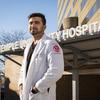Making the cut
Mehta was born in the Indian state of Gujarat. At the age of 10, his parents moved with him and his older brother Abhishek to Allentown, Pennsylvania. Mehta ultimately decided to attend Temple in the footsteps of his brother, who earned a bachelor of science in biology from Temple in 2014. “I loved the city environment and the in-state tuition was attractive,” said Mehta.
Admittedly “a very average student,” he was initially undecided about a major. But he quickly discovered that he loved his science classes and made the choice to major in biology. He was eventually accepted into the Temple Honors Program and even earned a Diamond Peer Teaching Award for helping teach younger students in one of Temple’s notoriously difficult organic chemistry courses.
In his second semester, Mehta became an undergraduate research assistant who served as a project liaison between two research labs—one led by Darius Balciunas, associate professor of biology, the other by Madesh Muniswamy, professor of medical genetics and molecular biochemistry in the Department of Translational Medicine at Temple’s Lewis Katz School of Medicine. The focus: using CRISPR/Cas9 gene-editing technology on zebrafish to study tissue regeneration capabilities.
“I thought the research was magical and it was paramount in me going to medical school,” said Mehta.
While at Temple, Mehta also trained to be a volunteer Temple emergency medicine technician. When a hospital patient’s heart stopped beating one day, Mehta immediately began CPR, which, in combination with the use of an automatic external defibrillator, saved the patient’s life. “It was scary, but at the same time it was an incredible feeling knowing that, in any setting, you can help someone,” he recalled.



